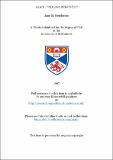Files in this item
Alain, "Philosophe-Poète"
Item metadata
| dc.contributor.author | Henderson, Jane M. | |
| dc.coverage.spatial | xi, 226 p. | en_US |
| dc.date.accessioned | 2018-05-21T14:28:23Z | |
| dc.date.available | 2018-05-21T14:28:23Z | |
| dc.date.issued | 1997-01 | |
| dc.identifier.uri | https://hdl.handle.net/10023/13427 | |
| dc.description.abstract | The central theme of this thesis is Alain's insight into the nature of the cognitive experience of literature. Aware that subjective and non-analytical factors have their part to play in all forms of knowledge, Alain grew increasingly hostile to the type of philosophy characterised by what he believed was an exaggerated use of the scientific method. The introduction shows that Alain was not the only Philosopher of his day to point to the potential superiority of literature over philosophy as a form of knowledge. The ensuing chapters suggest, however, that he went further than most of his contemporaries in probing the specific nature of the mental activities involved in the creation and appreciation of works of literature. The first chapter is on investigation of Alain's working method and of the epistemological assumptions behind it. This is followed by a chapter on language and one on Alain's own style in which it is suggested that his poetic attitude, shown an his respect for the obscurity and expressive ambiguity of the word, can be of greater cognitive value than the more restrictive attitude of most philosophers towards language. The next chapter is a discussion of Alain's criteria of criticism in literary matters and it reveals his hostility towards those writers who do not share his conviction that the task of the creative writer is one of exploring the world through the reality embodied in language itself. In his own literary commentaries, Alain condemns those who misconceive the nature of their medium and merely express pre-conceived ideas in literary form. His belief, discussed in the same chapter, that great works of literature constitute a world of expression which cannot be explained, attests once again to Alain's conviction that purely / purely logical discourse is inadequate in the face of lived experience. The final chapter shows how Alain considers that literary works, which offer cognitive experience in the form of subjective truths apprehended in the reading relationship, are of much greater value to man in his quest for knowledge than the works of psychologists or moralists whose aim is to prove or demonstrate some truth about human nature. | en_US |
| dc.language.iso | en | en_US |
| dc.publisher | University of St Andrews | |
| dc.subject.lcc | PQ2605.H4H3 | en |
| dc.subject.lcsh | Alain, 1868-1951 | en |
| dc.title | Alain, "Philosophe-Poète" | en_US |
| dc.type | Thesis | en_US |
| dc.type.qualificationlevel | Doctoral | en_US |
| dc.type.qualificationname | PhD Doctor of Philosophy | en_US |
| dc.publisher.institution | The University of St Andrews | en_US |
This item appears in the following Collection(s)
Items in the St Andrews Research Repository are protected by copyright, with all rights reserved, unless otherwise indicated.

